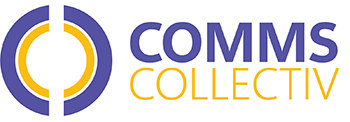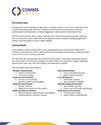CollectivNews
Welcome to a monthly round-up of information relevant
to comms professionals and everyone interested in the fractional model.
November 2024

AI Agents: The Future of Automated Communications?
As a fractional communications professional, staying ahead of technology trends is crucial. One of the developments in artificial intelligence we are following is the rise of AI agents – autonomous systems that can perform complex tasks with minimal human intervention.
It got us thinking — how are AI agents poised to revolutionize business communications and what does this mean for fractional comms experts…
What Are AI Agents?
AI agents are artificial intelligence systems capable of operating independently to achieve specific goals. Unlike traditional chatbots or AI assistants that respond to direct queries, AI agents can:
Plan and execute multi-step tasks
Use various tools and applications
Adapt to new information
Make decisions to accomplish objectives
For example, an AI agent could autonomously schedule meetings, book travel, or even draft and send emails based on high-level instructions from a human user.
The Impact on Communications
AI agents have the potential to transform how businesses handle both internal and external communications in several key areas:
Internal Communications: AI agents could streamline internal information flow.
Content Creation: Agents could draft, edit, and optimize various types of content across multiple platforms, ensuring consistent messaging and tone.
Media Relations: AI agents could monitor news, identify relevant opportunities, and even draft and distribute press releases with minimal human oversight.
Opportunities for Fractional Comms Professionals
As AI agents become more prevalent, fractional communications experts will need to adapt their roles to integrate AI and demonstrate their value:
Strategic Oversight: Focus on high-level communication strategy and creative direction, and let AI agents handle routine tasks.
AI Management: Develop skills in prompt engineering and AI agent supervision to maximize their effectiveness.
Human Touch: Emphasize uniquely human skills like emotional intelligence, crisis management, and nuanced stakeholder relationships.
Integration Expertise: Help businesses seamlessly incorporate AI agents into their existing communication workflows.
The Road Ahead
While AI agents are rapidly evolving, they’re not ready to fully replace human communicators…yet. Right now they are limited by the potential for errors and misunderstandings in complex situations, trouble with nuanced tasks and of course the ethics of letting AI make decisions.
That said, there is no doubt that AI agents will become indispensable tools for fractional communications professionals, augmenting human expertise rather than replacing it entirely.
To stay relevant and at the forefront of this exciting technological shift, all communications experts — especially those working fractionally — should embrace AI agents and develop complementary skills, adding greater value to their clients in an AI-enhanced future.
Recommended resources:
Our Insights Why Agents Are the Next Frontier of Generative AI

The Power of the Pool
What drew me to CommsCollectiv (CC) earlier this year was something I hope we all share: a sense of the power of group intelligence and collaboration. From my exposure to fractional executive services in the startup space, I immediately saw the market value of a networked talent pool of experienced comms executives.
We’ve all lived through the most exponential growth of knowledge in history, fueled by network effects and the digitalization of communications and information. The clear lesson of the Internet Age is that all of us are smarter than any of us.
But it wasn’t until I joined the latest Coffee and Camaraderie chat that I understood the breadth of the aggregate skills and experience CC was attracting.
That is the value proposition that CC can deliver: a deep bench of comms pros offering a depth and range of capabilities that was once only accessible to companies with the deepest pockets.
Jack Mason is a Co-Founder of BlueGreenNJ and an early member of the CommsCollectiv talent pool.

Lessons from Leaders and Others
One of the best pieces of business advice my father gave me was to be someone who makes decisions. He pointed out that you have a 50/50 chance of being right – and most people are not willing to take those odds.
A recent article in Fortune about the best lessons Steve Jobs taught Tim Cook brought this to mind. Per the piece on leadership by Natalie McCormick, “Among the key management skills he learned from Jobs was the importance of not being married to past beliefs, a competency that Cook says few leaders possess. Jobs welcomed debates, relished being challenged, and valued those who were willing to admit they were wrong when new evidence emerged.”
Communications is often an art not a science, and as someone who prefers to work with a partner whose skills complement mine, the need to find people that challenge you really resonated with me.
What is some of the best advice you’ve gotten from family, friends, colleagues or mentors?
Email us at info@commscollectiv.com and we will highlight it on LinkedIn and share it in our December newsletter.
Jane Randel is a Partner in CommsCollectiv and Co-President of social impact consultancy Karp Randel.

Managing Stress in Uncertain Times
Stress happens along a spectrum. There is positive stress in our lives like starting a new job. The next category is tolerable stress, and that can be falling and spraining your ankle. With a little bit of support and time you get over it. But then comes toxic stress. Toxic stress can happen with prolonged, severe or repeated exposure to adversity or uncertainty. Trauma is the impact that toxic stress leaves behind, and right now, the world seems to be full of sources of pretty toxic stress.
Fortunately, human lives are built with the capacity to not only to heal ourselves but to participate in the healing of others. One approach to use if you encounter someone experiencing extreme stress is Dr. Bruce Perry’s “3R’s” — Regulate, Relate, Reason.
Regulate by taking a deep breath and grounding yourself.
Relate by showing empathy and compassion.
Reason by moving into a more logical conversation and accessing that higher level of thinking.
This is a relatively simple approach, yet it is very effective in lowering the temperature and giving people a feeling of control.
This has been and is a tough time for all of us, and we don’t know what the next few months will bring. With that said, it’s heartening to know that there are mechanisms in place to deal with the uncertainties.
Courtesy of Sadie Elisseou, MD, Trauma-Informed Solutions Expert


